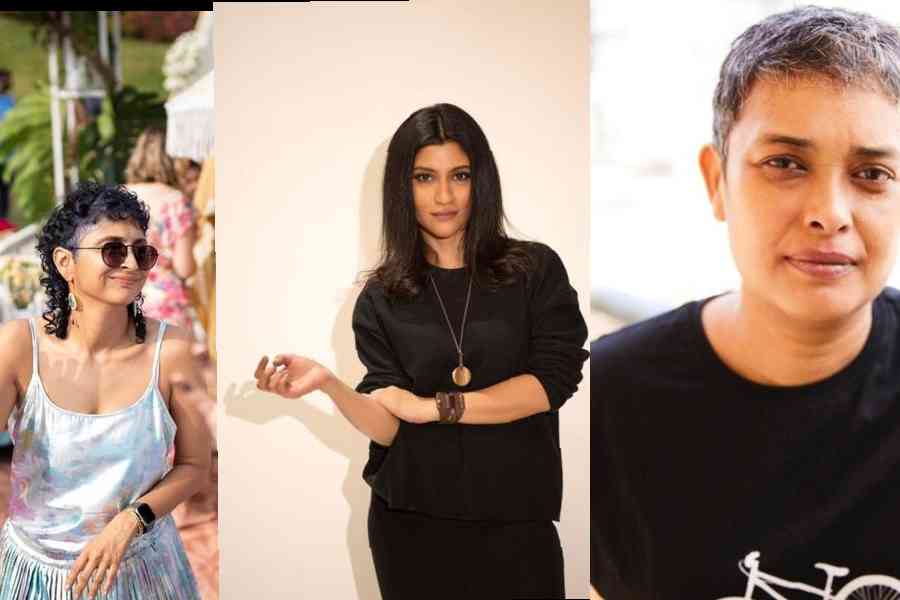KIRAN RAO
Kiran Rao has been on a high with the consistent accolades for her film Laapataa Ladies, which has successfully managed to become a critical and commercial darling. This is Kiran’s second endeavour after her directorial debut Dhobi Ghat, that was made more than a decade ago and was also critically acclaimed.
Kiran has always succeeded in making films which are local in their sensibilities, which are very much about ordinary people, all the while cleverly dissecting why they think and act the way they do. Her gaze as a filmmaker doesn’t villainise her characters for their way of thinking. In fact, she provides enough context and justification for the audience to understand the uniqueness of their individual perspectives. Kiran, along with former husband and superstar Aamir Khan, has also been an excellent producer over the decades, supporting new voices through films such as Delhi Belly, Talaash and Secret Superstar. We, for one, can’t wait for her next feature, and hope she doesn’t stay away from the silver screen for this long again!
KONKONA SENSHARMA
In 2017, Konkona Sensharma directed her debut feature film A Death in the Gunj, that she had adapted from her late father, Mukul Sharma’s short story. The slow-burn thriller had a robust cast, including Vikrant Massey, Kalki Koechlin, Tillotama Shome, Gulshan Devaiah and Ranvir Shorey. Lauded unanimously for its sensitive storytelling and Konkona’s astute direction, A Death in the Gunj is one of the best films from a first-time director in recent times.
While Konkona hasn’t directed another feature film yet, what we got from her last year was the incredible short called The Mirror which was part of the Netflix produced anthology Lust Stories 2. Starring magnificent actors like Tillotama and Amruta Subhash, this film focused on the complexity of class as seen through the prism of sex and voyeurism. What distinguishes Konkona from her contemporaries as a director has to be her eye for detail and the manner in which she shoots them.
REEMA KAGTI
Reema Kagti, who works closely in collaboration with Zoya Akhtar, another exciting female director, directed her debut film in 2007. Honeymoon Travels Pvt Ltd was a quirky tale focused on various kinds of relationships. She then helmed the neo-noir thriller Talaash, boasting a cast comprising Aamir Khan, Rani Mukerji and Kareena Kapoor Khan. Reema succeeded in making quite a thrilling film, thereby proving her versatility as a writer-director. Crystal-clear vision and a strong hold on her characters defines Reema’s capability as a director.
Her most recent project as a director has been the web series Dahaad, where casteism and gender politics were brought to the fore in the form of a police procedural with a serial killer on the prowl.
NANDITA DAS
A multihyphenate talent, Nandita Das has delivered diverse films as a director. Starting off with the brave and sensitive Firaaq, which was set against the backdrop of the 2002 Gujarat riots, Nandita deftly handled the multitude of perspectives that the characters of this film came with. Her ability to tell a story without judgment helps us understand and empathise with her characters. While her 2018 film Manto examined the life and times of the revolutionary thinker and poet Saadat Hasan Manto, her most recent directorial outing Zwigato looks at the quest of ordinary people finding ordinary ways to keep them going in the real world. Her stories, though harsh, accurately portray the hardships as well as the joys of life.
MIRA NAIR
The most notable name on this list belongs to Mira Nair whose cinema has travelled the world. Responsible for putting Indian stories on the world map, she started her career by making documentaries that explored the cultural heritage of India. Her early documentaries are stripped down in nature, with Mira utilising real people and their experiences as meaningful stories in her work. Her first feature, Salaam Bombay, explored the lives of children in the slums of Mumbai. Since then, it has been one groundbreaking exploration after another, be it Mississippi Masala, Kamasutra, Monsoon Wedding, The Namesake, The Reluctant Fundamentalist and Queen of Katwe.











